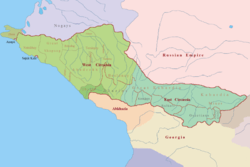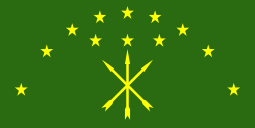Abazins
|
Flag of the Abazin | |
| Total population | |
|---|---|
| 60,000–100,000 (est.) | |
| Regions with significant populations | |
| 15,000–50,000[1] | |
| 50,000[2] | |
|
43,341 36,919 3,646 418 | |
| 400 | |
| 128[3] | |
| Languages | |
| Abaza, Russian, Turkish, Arabic | |
| Religion | |
| Predominantly Sunni Islam | |
| Related ethnic groups | |
| Abkhaz, Circassians | |
The Abazin, Abazinians, or Abaza (Abaza and Abkhaz: Абаза; Circassian: Абазэхэр; Russian: Абазины; Turkish: Abazalar; Arabic: أباظة) are an ethnic group of the Northwest Caucasus, closely related to the Abkhaz and Circassian people. They live mostly in Turkey, Egypt, and in Karachay-Cherkessia and Stavropol Krai in the North Caucasus region of Russia.
The Abazin originally inhabited the Sadzen region in the western part of Abkhazia and migrated from Abkhazia to Abazinia in 14th and 15th centuries. They later migrated to other regions of the Middle East in the 18th and 19th centuries. Since the late 18th century, their dominant religion is Sunni Islam (Hanafi).
Abaza people speak the Abaza language, a Northwest Caucasian language closely related to Abkhaz and Circassian. There are two dialects of Abaza spoken in Karachay-Cherkessia: Ashkharua and Tapanta. The culture and traditions of the Abazin are similar to those of the Circassians. On many old maps Abazin territory is marked as part of Circassia (Adygea).
According to the 2010 Russian census, there were 43,341 Abazins in Russia. An Abazin diaspora exists in Turkey[1] Egypt,[2] and in Middle Eastern countries such as Jordan and Syria, most of which are descendants of muhajirs from the Caucasian War with the Russian Empire.
There is a significant Abazin presence in Turkey. An estimated 150,000 Abaza live in the provinces of Eskişehir, Samsun, Yozgat, Adana, and Kayseri. Most of them belong to Ashkharua clan that fought against the Tsarist army and emigrated to Turkey after losing the battle of Kbaada (Krasnaya Polyana in today's Sochi), whereas the Tapanta clan fought with the Russian forces.
See also
References
- 1 2 Ethnologue.com
- 1 2 Websters-online-dictionary
- ↑ "About number and composition population of Ukraine by data All-Ukrainian census of the population 2001". Ukraine Census 2001. State Statistics Committee of Ukraine. Retrieved 17 January 2012.



